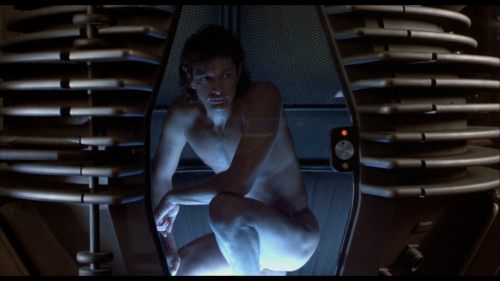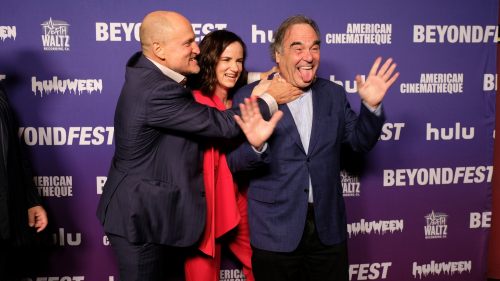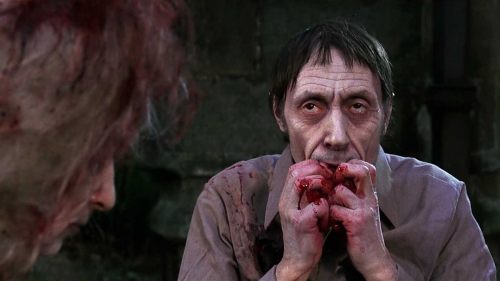The Shaping Of Rage: Beyond Fest Presents Four Early Films From David Cronenberg
There's a great piece about David Cronenberg contained in Fangoria #32 (published January ’84) written by American auteur Martin Scorsese. In it, Scorsese describes both his admiration for the Canadian horror filmmaker’s work, and his anxiousness regarding meeting Cronenberg for the first time, saying:
"I expected somebody who looked like a combination of Arthur Bremmer and Dwight Frye as Renfield in Dracula, slobbering for juicy flies. The man who showed up in my apartment in New York looked like a gynecologist from Beverly Hills."
It's true. One glimpse of Cronenberg (especially his boyishly handsome, bespectacled younger self) wouldn't inform you that he was the filmic mind behind such deranged classics as Videodrome and The Fly. When coupled with his incredibly soothing voice and disarmingly funny demeanor, what you're instead faced with is an often self-aware and effacing academic, who's quick to shed the label of "horror filmmaker." In fact, Cronenberg is the first to admit that he never even imagined becoming a director, as he studied Science before switching to Literature at the University of Toronto, harboring aspirations of becoming a novelist.
Shivers, Rabid, The Brood and Scanners (which became a box office smash upon its '81 debut) changed all that, and debatably the face of genre cinema forever. Cronenberg's early films announced a new voice that was so defined, even during his roughest moments as a young director, that the world couldn't deny what this tall, refined, motorcycle-crazed artist had to say via his low budget pieces of goopy pulp fiction.
Now, LA's Beyond Fest is celebrating his legacy with a 13 film, 35mm retrospective, where they got the man himself to come speak about his body of work over several nights. The centerpiece of Beyond's opening weekend was an all-day marathon titled "The Shaping of Rage", where a rapt audience got to witness all four of these formative films, and then listen to Masters of Horror guru Mick Garris conduct a Q&A with the writer/director (following a bonus screening of Cronenberg's ’88 trip away from horror/sci-fi, Dead Ringers). It was an incredible way to spend some time with arguably the most infamous portion of Cronenberg's filmography, which he was pleased to discuss at length.
*****

Shivers (a/k/a They Came From Within, a/k/a The Parasite Murders) [1975]
According to Cronenberg, he made his first feature, Shivers (though the title card on the battered, Frankenstein-spliced print we saw read The Parasite Murders), after a rather successful sojourn to Los Angeles, where the then-underground filmmaker met with American exploitation maestros such as American International and Roger Corman. The mad Canadian was all ready to make the move to the Best Coast, as it seemed like the only company in his home country that could pony up a meager sum to make the movie (Cinepix, who were mostly known for churning out politically-minded softcore "couples" films) was turned off by his bizarre screenplay, revolving around icky slugs that transformed human hosts into mindless machines, driven solely by sexual desire. However, upon returning to Toronto, the Canadian Film Development Corporation (a government entity tasked with kickstarting the country’s cinema industry) somewhat inexplicably bestowed Cronenberg the budget to helm his first lo-fi foray into the artist's now legendary bodily fascinations.
The end result is an unpolished, upsetting work of paranoid, self-contained horror, punctuated with moments of black humor. Shivers somewhat resembles a carnally-minded Canadian answer to H.G. Lewis' Florida-based splatter. Call it Flesh Feast; a jangly and often unpleasant amalgamation of Cronenberg's desire to see the human body as little more than a disposable vessel, possessed by parasites that were manufactured by a man looking to transform the world into one large, mindless orgy. This first feature laid the groundwork for the "sex and death" thematic obsessions that'd dominate a large chunk of his ensuing output. The fact that he got one of Mario Bava's favorite female horror icons (Barbara Steele), and Crazies refugee Lynn Lowry to play in this initial perverted sandbox was only further proof (aided in no small part by chance encounters he had with both actresses while visiting Hollywood) that Cronenberg belonged in the class of celluloid madmen (along with Romero, Tobe Hooper and Wes Craven) who were emerging during the 70s via these independently financed nightmares of a damaged world.

Rabid [1977]
The mere casting of adult film actress Marilyn Chambers ostensibly seems like Cronenberg's doubling down on the wanton sexuality that dominated his first full-length trip behind the camera. For his follow-up, Rabid, the sticky chaos of Shivers spills out of the high-rise and into the streets of Montreal, as Chambers' injured Barbie Doll, Rose, is patched up via an experimental procedure, only to grow a bloodthirsty orifice in her armpit. In a sense, she becomes a technological Typhoid Mary, advancements in medicine inadvertently creating an outbreak, as anyone that Rose bites with her second "mouth" is transformed into a slobbering maniac. Where Lynn Lowry's involvement in Shivers gave that movie an unintentional tie to the zombie mastermind's brand of indie horror cinema, Rabid feels like The Crazies' poutine-loving cousin, full of similar apocalyptic imagery (especially once the cleanup men in white Hazmat suits arrive).
The scrappiness of Rabid is probably its greatest charm, as Cronenberg crafts a movie that's distinctly of the same voice that gave us Shivers, while simultaneously expanding in scope. Producer and music supervisor Ivan Reitman unifies the two pictures with a combination of ominous and airy library music (as they couldn’t afford an original score), while cinematographer René Verzier (Rituals) imbues every frame with the same coldness that made even the warmest apartment in Shivers seem frigid and distant. Cronenberg's cast of day players grows here, as well, as Joe Silver returns to bestow the movie with much needed comic relief (before his happy papa endures his own tragedy) and Robert Silverman lends his comb-over and slithering screen presence to one of the patients at the central "KFC of Plastic Surgery". The key pieces of Cronenberg's signature style were coming together, and would combine perfectly in The Brood to form his first true masterpiece.

The Brood [1979]
The Brood feels the most "human" of Cronenberg's early horror films, which is easily explainable, seeing how the filmmaker was dealing with a number of all-consuming emotions at the time: fear and rage. His marriage (to first wife Margaret Hindson) collapsed in '77, and the moderately successful young auteur was dealing with nightmares regarding her running off and giving birth to several children, who in turn set out to kill him. So, Cronenberg channeled all those festering, conflicting feelings into his very first magnum opus: ‘79's The Brood. Easily his most thoroughly realized film to date, The Brood sees a stand-in for the director (Art Hindle) dealing with his own estranged wife (Samantha Eggar) who's fending off a metric ton of depression via the "psychoplasmics" therapy of Doctor Ragland (Oliver Reed). However, the anger she channels through this treatment manifests itself in the form of deformed, murderous children who do her psychic bidding.
Howard Shore was also present for the event's Q&A, and chimed in regarding how he'd always admired David, even when he was a kid growing up (where the two lived close to one another, and Cronenberg was always "the cool guy on the Ducati motorcycle", a few years older than the eventual Academy Award-winning composer). The cascading portentousness that Shore injects into his first OST for Cronenberg (which would result in a life-long creative partnership) contains themes that would run through the next four movies the two worked on together, culminating in The Fly. So, beyond the director finally making a picture that combines genuine pathos with his clinical approach, The Brood helped introduce the world to a musical mind whose sonics would be heard in a slew of classics to come.

Scanners [1981]
The first of Cronenberg's "secret wars" sci-fi/horror films (that would later include '83's Videodrome and '99's eXistenz), Scanners is the moment when his idiosyncratic sensibilities went mainstream (at least, relative to the rest of his work's receptions). On paper, the movie has a superficially straightforward evil-psychic killers-vs.-good-psychic killers plot not too far removed from Brian De Palma’s '78 hit The Fury (not to mention acts as a dark X-Men movie precursor). Gone is the brooding, moody, personal horror of The Brood, replaced by an almost propulsive pace, as corporate agents try and engineer an already destined showdown between two rogue mind warriors (Stephen Lack and Michael Ironside) in an attempt to help contain these dangerous telepaths, or even exploit their abilities for financial gain.
Naturally, the splatter remains, in arguably the most ostentatious moment of gore in Cronenberg's career to date (courtesy of legendary makeup SFX artist Dick Smith). The iconic head explosion that occurs during the movie's first act (along with the still chilly visual compositions) remind us that only one man could be commanding the camera for this film. No matter how close the Canadian was to becoming something of a sensation (with Scanners grossing nearly $15 million at the box office), he was always going to harbor the same eccentricities and perversions, which would culminate in his next masterpiece, '83's Videodrome. When accompanied with a second bombastic Howard Shore score, the filmic shape of Cronenberg's rage had fully formed, and was now going to produce two more "body horror" staples (with The Fly being his perfect swan song) before the filmmaker expanded into more “serious” dramatic fare with the decade-in-the-making twin gynecologists opus Dead Ringers.
Beyond Fest continues tonight with a 35mm double feature of Videodrome and eXistenz. Check out the rest of the schedule (and nab your tickets) here.



